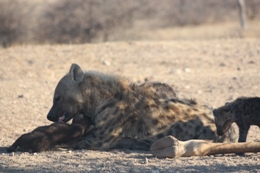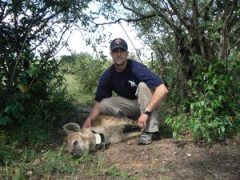08 October 2015
 Immunity research on hyenas in the wilds of Kenya could provide new perspectives on old problems in humans like the ‘hygiene hypothesis’.
Immunity research on hyenas in the wilds of Kenya could provide new perspectives on old problems in humans like the ‘hygiene hypothesis’.
The hygiene hypothesis suggests a young child’s environment can be ‘too clean’, with lack of exposure to germs leading to defects in the establishment of immune tolerance.
In research published today in peer-reviewed scientific journal PLOS One, researchers from South Australia and the United States have shown that wild hyenas from the Masai Mara in Kenya had significantly higher serum antibody concentrations than hyenas born and raised in a captive facility.
Lead author on the research was Research Fellow in UniSA’s School of Pharmacy and Medical Sciences Dr Andy Flies, who says the differences observed between wild and captive hyenas suggest that environmental and ecological factors are important modulators of immune response.
“Only a few previous studies have examined the differences between wild animals in their natural environments, in which they are typically exposed to a wide array of potential pathogens, and captive animals in a relatively pathogen free environment,” Dr Flies says.
“This study used captive hyenas that were derived directly from the wild population, so genetic differences were minimal. Spotted hyenas rarely die from infectious disease, suggesting that hyena immune defences are robust.”
 Dr Flies says wild hyenas have significantly higher serum antibody concentrations, including total IgG and IgM, natural antibodies, and autoantibodies than do captive hyenas.
Dr Flies says wild hyenas have significantly higher serum antibody concentrations, including total IgG and IgM, natural antibodies, and autoantibodies than do captive hyenas.
“What we found here in regard to IgM differ from results of mice studies, suggesting that complementing traditional immunology studies with studies of animals in natural environments may help uncover links between environment and immune function, and facilitate progress towards answering immunological questions associated with the hygiene hypothesis,” he says.
Co-authors on the paper, which can be viewed at PLOS One, are Dr Linda Mansfield from Michigan State University, Dr Chris Grant from Custom Monoclonals International Corp in California, and Dr Kay Holekamp from University of California Berkeley.
Dr Flies is a former PhD student on the Michigan State University Hyena Research Project and is a co-founder of Science in the Pub Adelaide and Science in the Pub Tasmania.
Read more about Dr Flies postdoctoral and PhD work on his new research blog http://wildimmunity.com/
Contact for interview: Dr Andy Flies mobile 0468 667 547 email Andrew.flies@unisa.edu.au
Media contact: Kelly Stone office 8302 0963 mobile 0417 861 832 email Kelly.stone@unisa.edu.au


